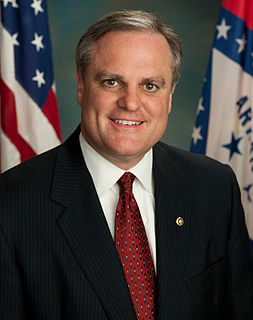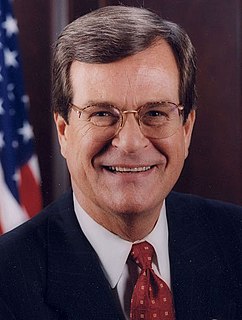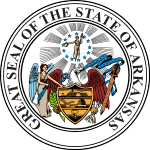
Mark Lunsford Pryor is an American attorney and politician who served as a United States Senator from Arkansas from 2003 to 2015. While he ran for office as a Democrat and affiliates with the Democratic party, he registered to vote with no party affiliation. Prior to becoming senator, he was Attorney General of Arkansas from 1999 to 2003.

The 1998 United States Senate elections were held on November 3 and seen as an even contest between the Republican Party and Democratic Party. While the Democrats had to defend more seats up for election, Republican attacks on the morality of President Bill Clinton failed to connect with voters and anticipated Republican gains did not materialize. The Republicans picked up open seats in Ohio and Kentucky and narrowly defeated Democratic incumbent Carol Moseley Braun (Illinois), but these were cancelled out by the Democrats' gain of an open seat in Indiana and defeats of Republican Senators Al D'Amato and Lauch Faircloth. The balance of the Senate remained unchanged at 55–45 in favor of the Republicans. With Democrats gaining five seats in the House of Representatives, this marked the first time since 1934 that the out-of-presidency party failed to gain congressional seats in a mid-term election, and the first time since 1822 that the party not in control of the White House failed to gain seats in the mid-term election of a President's second term. These are the last senate elections that resulted in no net change in the balance of power.

Arkansas's 2006 state elections were held November 7, 2006. Primaries were held May 23 and runoffs, if necessary, were held June 13. Arkansas elected seven constitutional officers, 17 of 35 state senate seats, all 100 house seats and 28 district prosecuting attorneys, and voted on one constitutional amendment and one referred question. Non-partisan judicial elections were held the same day as the party primaries for four Supreme Court justices, four appeals circuit court judges, and eight district court judges.

The 2008 United States Senate election in Arkansas was held on November 4, 2008. Incumbent Democratic U.S. Senator Mark Pryor decided to run for a second term. No Republican filed to challenge him. His only opponent was Green Party candidate Rebekah Kennedy. He won re-election with almost 80% of the vote.

The 2010 United States Senate election in Arkansas took place on November 2, 2010 alongside other elections to the United States Senate in other states, as well as elections to the United States House of Representatives and various state and local elections.

The 2010 congressional elections in Arkansas was held on November 2, 2010, to determine who would represent Arkansas in the United States House of Representatives. Arkansas has four seats in the House, apportioned according to the 2000 United States Census. Representatives are elected for two-year terms; those elected will serve in the 112th Congress from January 3, 2011 until January 3, 2013. None of Arkansas's four representatives faced major party opposition in 2008. As of 2016, this is the last election in which a Democrat won a congressional district in Arkansas.

Elections to the United States Senate on November 4, 2014, were a part of the United States 2014 elections. Thirty-three Class 2 seats in the 100-member United States Senate were up for election, in addition to three Class 3 seats due to expire on January 3, 2017. The candidates winning the regular elections would serve six-year terms from January 3, 2015 to January 3, 2021. The elections marked 100 years of direct elections of U.S. Senators. Twenty-one of the open seats were held by the Democratic Party, while fifteen were held by the Republican Party.

The 1998 United States Senate election in Arkansas was held November 3, 1998. Incumbent Dale Bumpers did not run for re-election, as he was retiring. U.S. Representative Blanche Lincoln won the open seat against State Senator Fay Boozman. 12 years later she would be defeated by Fay's younger brother John Boozman in 2010.
Gilbert R. Baker is a Republican former member of the Arkansas State Senate for District 30, with service from 2001 to 2013. In 2010, Baker was an unsuccessful candidate for the United States Senate seat formerly held by the Democrat Blanche Lincoln.

The 2012 United States Senate election in Nebraska took place on November 6, 2012, concurrently with the 2012 U.S. presidential election as well as other elections to the United States Senate and House of Representatives and various state and local elections.

Fay Winford Boozman III was a Republican politician from the U.S. state of Arkansas, a close friend of former Governor Mike Huckabee and a 1998 candidate for Senate.
Elections for state and federal offices for the 2010 election cycle in Connecticut were held on Tuesday, November 2, 2010. Any necessary primary elections for the Republican and Democratic parties were held on Tuesday, August 10, 2010.

The 2012 United States House of Representatives elections in Arkansas occurred on Tuesday, November 6, 2012 to elect the four U.S. Representatives from the state, one from each of the state's four congressional districts. The elections coincided with the elections of other federal and state offices, including a quadrennial presidential election.

The 2016 United States Senate election in Arkansas was held November 8, 2016, to elect a member of the United States Senate to represent the State of Arkansas, concurrently with the 2016 U.S. presidential election, as well as other elections to the United States Senate in other states and elections to the United States House of Representatives and various state and local elections.

A general election was held in the U.S. state of Arkansas on November 4, 2014. All of Arkansas' executive officers were up for election as well as a United States Senate seat, and all of Arkansas' four seats in the United States House of Representatives. Primary elections were held on May 20, 2014 for offices that need to nominate candidates. Primary runoffs, necessary if no candidate wins a majority of the vote, were held on June 10, 2014.

The 2020 United States elections will be held on Tuesday, November 3, 2020. All 435 seats in the United States House of Representatives, 34 of the 100 seats in the United States Senate, and the office of President of the United States will be contested. Thirteen state and territorial governorships, as well as numerous other state and local elections, will also be contested.




























